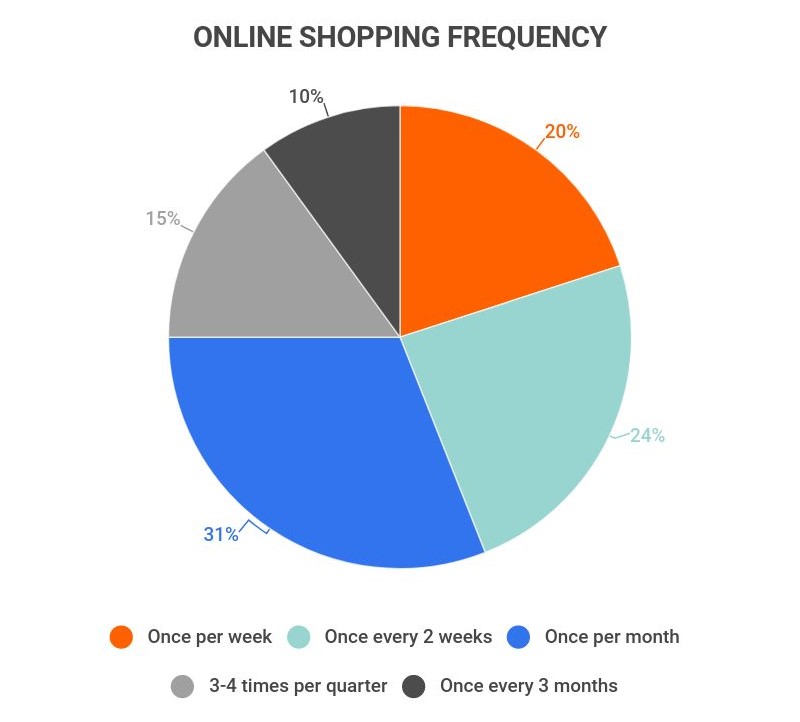Online shopping research summary. Online shopping has completely transformed the consumer market over the past few decades. However, it still has a long way to go before it overtakes in-person shopping. In spite of its immense popularity, online shopping still lacks some of the convenience and immediate satisfaction that people crave when they’re buying things.
Overall, to find out more about online shopping statistics, as well as how recent years have impacted in-store shopping, we’ve done our research. Here are some of the key takeaways we’ve uncovered:
-
21% of global retail sales are online as of 2022
-
2.14 billion people shopped online globally in 2020.
-
75% of consumers shop online at least once a month.
-
Global e-commerce retail sales reached $5.7 trillion in 2022.
-
A massive 63% of all shopping journeys begin online, whether or not the consumer ends up making their purchase online or in-store.
-
22.3% of worldwide total retail sales will be online by 2023
For further analysis, we broke down the data in the following ways:
Online Shopping Vs. In-Store Shopping | Trends and Projections | Mobile Shopping | Consumer Preferences | Social Media Shopping

General online shopping statistics
Online shopping trends and statistics can reveal a lot about the general state of online shopping. For more information, we’ve gathered some interesting and essential online shopping statistics:
-
268 million Americans shopped online in 2022.
That means nearly 81% of the American population shopped online in 2022. The number of Americans who shop online has been steadily increasing since 2016.
-
63% of buying journeys begin online.
Over half of consumers rely on Google, social media, and other tools to begin their shopping experience. Additionally, around half of shoppers who shop in-store first end up going online afterward.
-
75% of consumers shop online at least once a month.
More specifically, 31% of consumers have reported shopping only once per month, while 24% said once every two weeks, and 20% said once per week. Conversely, only 25% of consumers shop online 3-4 times per quarter or less.

Online shopping vs. in-store shopping statistics
In-store vs online shopping statistics are a great way to measure the shifts in consumer preferences over time. For example, despite the effects of the COVID-19 pandemic, many shoppers still prefer shopping in-person. For more interesting trends, check out these statistics:
-
Almost 40% of consumers make an in-store purchase at least once a week. Comparatively, only 27% of shoppers make an online purchase at least once a week.
-
65% of consumers prefer in-store shopping to avoid delivery fees.
-
60% of consumers said that they favor in-person shopping because it allows them to have their items immediately.
-
61% of shoppers said that they prefer in-store shopping because they want to see or try on the items they’re buying.
-
81.8% of U.S. consumers prefer buying groceries in person instead of online.
Online shopping trends and projections
Online shopping trends show an impressive increase in interest since online shopping began. Twenty years ago online shopping was nearly non-existent, but not a majority of the US population uses sites like Amazon to purchase online regularly.
-
Online sales grew by over 56% between 2019 and 2022
In 2019, online sales totaled $578.50 billion. By 2022, online sales had reached $905 billion.
-
U.S. e-commerce sales are projected to reach $1.1 trillion by 2023.
This would be an increase of over 36% year over year since 2022. In 2022, U.S. e-commerce sales were $805 billion.
-
It’s predicted that there will be over 278.33 million online shoppers in the United States by 2023.
In 2020, there were only 255.99 online shoppers in the United States. In other words, this would represent an increase of 8.7%.
Percentage of U.S. retail sales that were online 2012-2022
| Year | Online Sales | Offline Sales |
|---|---|---|
| 2012 | 5% | 95% |
| 2013 | 5.8% | 94.2% |
| 2014 | 6.5% | 93.5% |
| 2015 | 7.3% | 92.7% |
| 2016 | 8% | 92% |
| 2017 | 9% | 91% |
| 2018 | 9.9% | 90.1% |
| 2019 | 11.1% | 88.9% |
| 2020 | 14.2% | 85.8% |
| 2021 | 14.2% | 85.8% |
| 2022 | 16.1% | 83.9% |
Mobile and social media shopping statistics
Online shopping is driven in part by trends on social media. Mobile phones and the apps they come with influence consumer spending in many ways, and to find out how these influences impact online shopping, we’ve gathered some essential facts:
-
54% of smartphone users say that they enjoy window shopping on their mobile device.
This is likely due to the scroll feature phones provide.
-
77% of smartphone users say that they impulse buy for fun.
Mobile online shopping opportunities help produce excitement in their presentation and design.
-
81% of shoppers research a product online before purchasing it.
This means retail merchants have to be conscious of their online presence.
-
In 2019, one study found that 36% of US consumers have bought an item directly via social media.
This number is only likely to grow as more companies will invest in their social media marketing campaigns.
Online shopping statistics by consumer preferences and opinions
Online shopping is also influenced by consumer preferences and opinions, just like any other form of shopping. In fact, online shopping often relies even more heavily on reviews and quality photos, as consumers are unable to thoroughly inspect the product themselves. To find out more about how consumer preferences and opinions impact online shopping, here are some key statistics:
-
75% of online shoppers mainly rely on product photos when they’re deciding on a purchase.
It’s believed that providing product images greatly increases the chance that a consumer will actually buy the item.
-
Approximately 57% of U.S. consumers prefer to shop online during the holiday season.
Alternatively, about 43% of shoppers in the United States said that they plan to shop in-store during the holiday season.
-
According to one study, over 80% of people are deterred from shopping at a store because they have an inconvenient return policy.
That’s why lots of shoppers prefer using big corporations, like Amazon, because their return policy is so easy to deal with.
-
Fashion product purchases account for 23% of total online sales in the United States.
This percentage has experienced a period of growth over the past 20 years.
Online shopping statistics FAQ
-
Is online shopping more popular than in-store shopping?
No, online shopping is not more popular than in-store shopping. As of 2021, In-store shopping is still more popular than online shopping, with 80.9% of sales being offline, and 19.1% being online. Even in 2022, online retail sales have only reached 21% of all global sales.
However, this isn’t to say that online sales aren’t growing. For example, between 2012 and 2022 overall online sales have grown by 162.5%. With that in mind, it is possible that in the next 10-20 years online shopping will become more popular than in-person shopping.
-
What percentage of global retail sales are online?
21% of global retail sales are online as of 2022. This shows that even in spite of the spike in online sales caused by the COVID-19 Pandemic in 2020, brick-and-mortar shopping still reins supreme around the globe.
-
Why do customers prefer in-store shopping?
Many customers prefer in-person shopping because it provides them with the immediate satisfaction of getting the product they’re buying. A lot of other consumers like to see or try on the product they’re considering in person before committing. Shopping online can be a little too hit or miss.
-
What percentage of Americans shop online?
81% of the American population shopped online at least once in 2022. While the pandemic was a major driving force for online sales, there are still many Americans in rural areas who rely on online shopping for many of their daily nessessities. From grocery shopping to furniture browsing, online shopping is becoming more and more popular with Americans.
-
How many people bought something online in 2021?
Over 2.14 billion people bought something online in 2021 globally. That’s just over 27% of the global population, meaning that over a quarter of the people on earth now make purchases online.
Conclusion
While online shopping was once only a trend, it has become a significant rival to the in-person shopping scene over the past couple of decades. As of 2022, 21% of global retail sales are online. Over two billion people bought something online in 2021.
In the United States alone, over 268 million people shopped online in 2022. That’s 81% of the American population. Global e-commerce retail sales reached nearly $5 trillion last year. Those are some huge numbers compared to 20 years ago.
Today, many people are turning to online shopping as their main avenue of purchasing goods. Up to 75% of consumers shop online at least once a month. Over 60% of buying journeys start online, either with research or browsing. However, lots of people still prefer in-person shopping to make purchases online.
65% of people say that they prefer in-person shopping because they can avoid delivery fees. Another 60% stated that they tend to shop in person because they can get their items immediately.
While many people are a little wary of online shopping, there’s no doubt that the industry is growing. 22.3% of worldwide total retail sales are expected to be online by 2023. By 2023, it’s predicted that U.S. e-commerce sales will surpass 1 trillion dollars and that there will be over 278 million online shoppers.
References
-
Statistica. • E-commerce share of total retail sales. Accessed on May 19, 2022
-
Statistica. E-commerce worldwide – statistics & facts. Accessed on May 19, 2022
-
International Post Corporation. Cross-Border E-Commerce Shopper Survey International Post Corporation. Accessed on May 19, 2022
-
Statistica. • Global retail e-commerce market size 2014-2023 | Statista. Accessed on May 19, 2022
-
Shopify. Global Ecommerce: Stats and Trends to Watch to Succeed Internationally (2022). Accessed on May 19, 2022
-
Statistica. • Number of digital shoppers in the US 2021 | Statista. Accessed on May 19, 2022
-
Think With Google. Online shopping behavior statistics. Accessed on May 19, 2022
-
Business News Daily. Shoppers Still Prefer In-Store Over Online Shopping. Accessed on May 19, 2022
-
Retail Wire. Online grocery shopping is pretty much all about convenience. Accessed on May 19, 2022
-
Global News Wire. The joy of online discovery; 54% of global shoppers enjoy virtual window shopping more than in-store browsing. Accessed on May 19, 2022
-
Rag Trader. This makes 77% of customers impulse buy on mobile. Accessed on May 19, 2022
-
Sales Lion. 81% of Shoppers Research their Product Online before Purchasing. Accessed on May 19, 2022
-
Statistica. • US online consumers social media online shopping | Statista. Accessed on May 19, 2022
-
Digital Commerce 360. US ecommerce grows 14.2% in 2021 | Digital Commerce 360. Accessed on May 19, 2022
-
Digital Commerce 360. [Infographic] Ecommerce vs. total retail sales from 2012-2021. Accessed on May 19, 2022
-
Statistica. • US e-commerce market size 2016-2023 | Statista. Accessed on May 19, 2022
-
Finances Online. Number of Digital Shoppers in the US 2022/2023: Demographics, Statistics, and Predictions. Accessed on May 19, 2022
-
Seattle Web Design. Three Huge Statistics About eCommerce Product Photography (And What to Do About Them). Accessed on May 19, 2022
-
Statistica. • US in-store vs. online holiday shopping 2021 | Statista. Accessed on May 19, 2022
-
ReadyCloud. Ecommerce Returns Statistics | ReadyCloud. Accessed on May 19, 2022
-
Statistica. Fashion e-commerce in the United States. Accessed on May 19, 2022
-
Statistica. E-commerce as percentage of total retail sales in the United States from 2013 to 2025. Accessed on February 6, 2023








